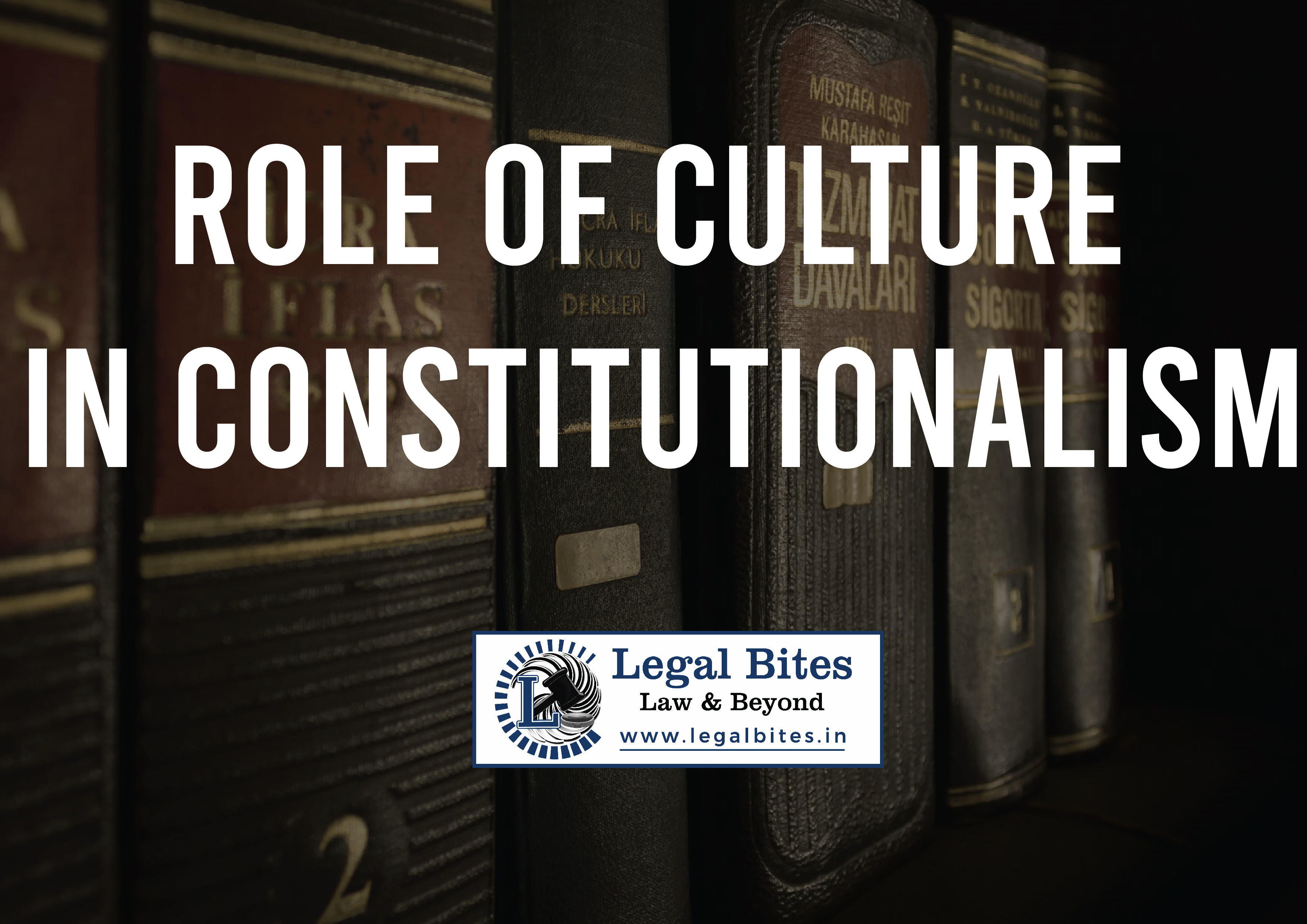Role of Culture in Constitutionalism
A political culture having tolerance and trust as its central elements can be said to be the very heart and soul of a constitutional state.

This article deals with the role of culture in constitutionalism. The rule of law, in a constitutional state, prevails not because of any politically superior authority but because of the confidence that the people have in the legal system of the country. This particular argument calls for an examination of the role of culture in constitutionalism. A democratic state requires its citizens to willingly obey the law. Such willingness shall only come if it is believed that the actions of...
This article deals with the role of culture in constitutionalism. The rule of law, in a constitutional state, prevails not because of any politically superior authority but because of the confidence that the people have in the legal system of the country. This particular argument calls for an examination of the role of culture in constitutionalism.
A democratic state requires its citizens to willingly obey the law. Such willingness shall only come if it is believed that the actions of the government are "legitimate, responsive to popular consent, and subject to appeal pursuant to established procedures for control." Such a state where the people willingly obey the law can be said to be a "constitutional" state. Achieving the goal of a constitutional state requires a very complex interplay between social, political and economic factors.
Development of a Constitutional State
Constitutionalism, or simply put, rule of law in a State may be established in any one of the following ways:
- Organic or Evolutionary- The rule of law may be developed with the passage of time. This particular process requires the formation of a distinct national identity which differs from the ethnic identity of the citizens. Australia and the United States of America have followed this particular method.
- By Imposition- Rule of law may even be forcefully imposed in a State by an external entity. This particular method has been criticized by several scholars on the ground that a "rule of law" can never be "forcefully imposed" upon a State. However, there have been several examples throughout the course of history where the occupying power has allowed its subject states to have their own independent constitutional rule.
- In pursuit of National Identity- The third process is one that bypasses the evolutionary process and does not call for an outside entity to impose constitutional order in the State. This particular method requires the citizens to have an identity homogeneous enough to constitute a democratic nation. Thus, it is formed "in pursuit of national identity".
Although the aforesaid methods may receive their own fair share of criticism, one thing that is clear is the important role played by culture in building a constitutional state. In order to constitute a successful constitutional state, it is imperative for people to willingly accept and abide by the rule of law.
'Culture'
Historically, 'culture' has been studied as an important aspect that shapes political outcomes. However, due to its immeasurability and problems of cultural stereotyping, it has failed to keep up with the modern trend of scientific behavioralism. Eventually, cultural explanations were replaced by a new "institutional focus". Although the socio-economic variables may be easy to calculate, it may not be sufficient to do the job.
It is argued that the difficulties in studying cultural factors must not lead to its ruling out as a significant factor in the development of a state.
According to Max Weber, "In interpreting action, the sociologists must take account of the fundamentally important fact that the collective concepts which we employ in our thinking, whether in legal or other specialist context or in everyday life, represent something: what they represent is something which in part actually exists and has a normative force in the minds of real men (not only judges and officials but also the general public) whose actions take account of it. Because of this, they are of great, often absolutely vital, importance in giving a causal explanation of the way in which the actions of real human beings proceed."
The term "collective concepts" refers to shared beliefs about certain objects in society. It is an important element of culture. Without such a collectivity in thoughts, the existence of a constitutional state is impossible.
Culture of Trust and Tolerance
Now that we have evaluated the important role played by culture in constitutionalism, it is imperative to evaluate the kind of culture that would facilitate the purpose of establishing a constitutional state. Such a culture has to have two central elements- trust and tolerance. It is impossible that there shall only be the prevalence of a single viewpoint. There are bound to be disagreements and deviances based on factors such as class, ideology, religion or ethnicity.
Thus, the people in the society must have tolerance towards the ideas and beliefs of other people. The people must "agree to disagree". Only such an element of tolerance shall facilitate the growth of a constitutional state.
The next question that comes up is pertaining to the disputes that might arise due to conflicting ideas and beliefs. The political process of a country must become a forum for the resolution of such disputes. The people should sincerely abide by the outcome of such a process. A political culture having tolerance and trust as its central elements can be said to be the very heart and soul of a constitutional state.
References
- D.P. Franklin et. al., "Political Culture and Constitutionalism: A Comparative Approach", M.E. Sharpe Publishing (1995).


